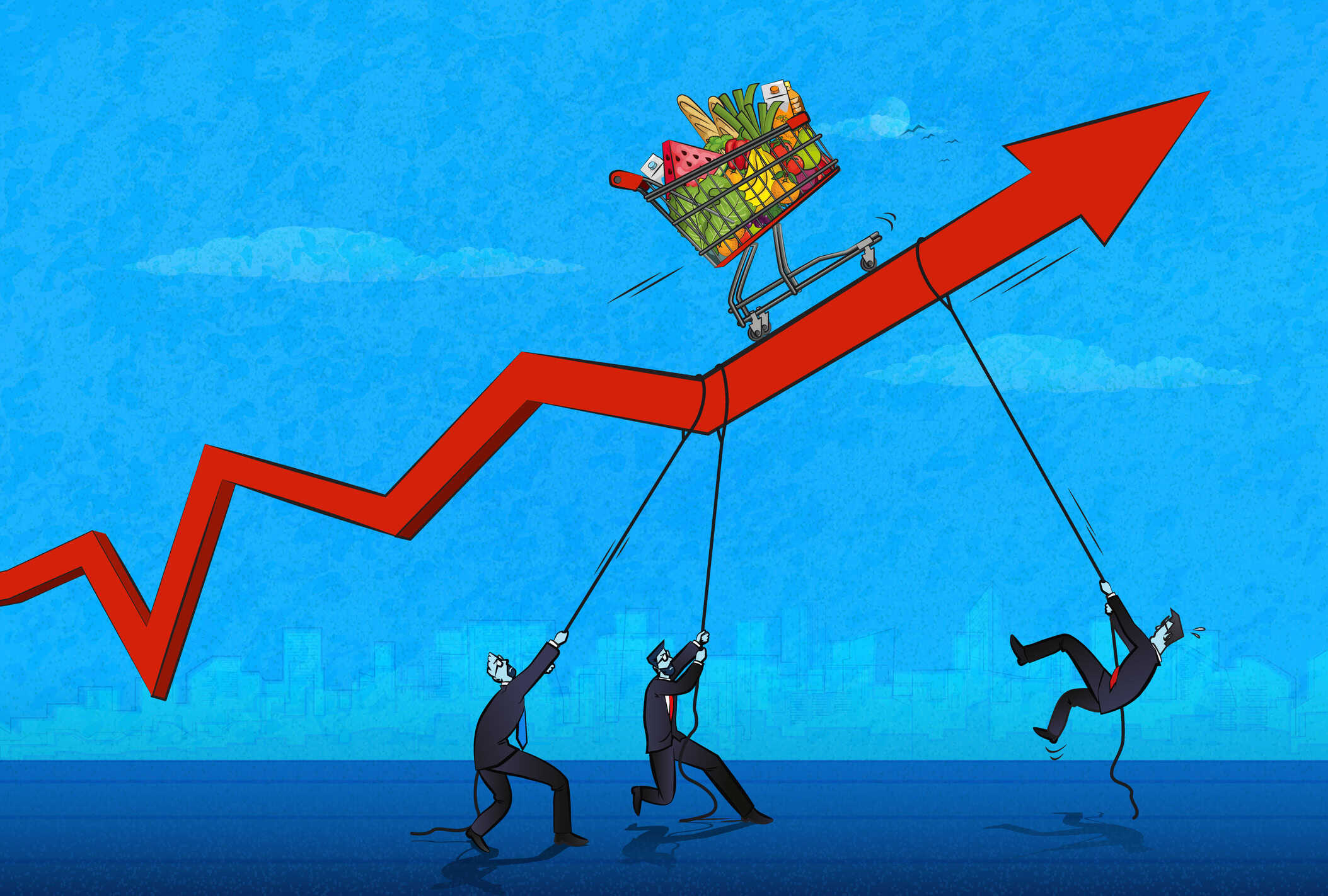
iStock.com/Cemile Bingol
August 19, 2024
Would a Price Gouging Ban Restrain Inflation?
Vice President Kamala Harris’ proposal to ban “price gouging” to combat runaway inflation in recent years is expected to prove popular with voters but sparked criticism from some economists.
“My plan will include new penalties for opportunistic companies that exploit crises and break the rules,” said Harris on Friday as she offered details of her economic agenda less than three months before the presidential election.
Harris said inflation had fallen below 3% for the first time since March 2021, according to a recent federal report.
“Our supply chains have now improved, and prices are still too high,” Harris said. “Many of the big food companies are seeing their highest profits in two decades. And while many grocery chains pass along these savings, others still aren’t.”
She continued, “Look, I know most businesses are creating jobs, contributing to our economy, and playing by the rules. But some are not, and that’s just not right, and we need to take action when that is the case.”
No details on how the ban would work were provided, but the plan could resemble the price-gouging bans currently in place in 37 states, which prohibit a sudden spike in prices for scarce goods.
The debate over the causes of inflation in recent years remains unresolved. While the San Francisco Federal Reserve found no strong link between price gouging and inflation, progressive think tanks argue there may be a direct connection.
Biden administration economists have found that corporate behavior has played a role in pushing up grocery costs in recent years — but that other factors have played a much larger one.
Lindsay Owens, executive director of the progressive advocacy group Groundwork Collaborative, in a statement on Friday echoed the Harris campaign’s criticism of the broken market for groceries.
“Price gouging, price fixing, and just plain profiteering are rampant in the food and grocery sector,” Owens said. “There is still more the government can do to reduce food and grocery concentration and stop the cheating that is costing families dearly.”
Some economists, however, rejected the notion of corporate power as an important cause of inflation, saying a limit on price hikes could result in shortages of goods.
Gavin Roberts, chair of Weber State University’s economics department, studied anti-price gouging laws enacted during the pandemic and observed that such measures often prompted consumers to buy more than they typically would, exacerbating shortages.
When prices are high, the best policy is often no action at all, Roberts told CNN, explaining that consumers deterred by high prices of items like beef might switch to other types of proteins, helping maintain stock levels for those willing to pay more. The higher prices often encourage new competition that eventually lowers prices in the long run, he argues.
Jason Furman, a top economist in the Obama administration, shared Roberts’ view that anti-price gouging laws could inadvertently harm consumers. “This is not sensible policy, and I think the biggest hope is that it ends up being a lot of rhetoric and no reality,” he told the New York Times. “There’s no upside here, and there is some downside.”
Prices have cooled sharply as the shocks from pandemic-era supply chain issues and the war in Ukraine fade. In July, grocery prices were up only 1.1%, in line with pre-pandemic increases. However, grocery prices are still 21% higher than they were when President Joe Biden took office.
An Economist/YouGov poll of about 1,600 U.S. adults, conducted Aug. 11-13, found inflation/prices to be the “most important issue” among 15 topics, followed by jobs and the economy, immigration, and healthcare.
Discussion Questions
Would a federal ban on price gouging curb rising food prices or create more economic hurdles?
Do you see a path to add safeguards against corporate profiteering without impeding competition?
How much of the food inflation in recent years reflects suppliers and retailers taking advantage of supply/demand imbalances?
Poll
BrainTrust
Mark Ryski
Founder, CEO & Author, HeadCount Corporation
Cathy Hotka
Principal, Cathy Hotka & Associates
Brad Halverson
Principal, Clearbrand CX
Recent Discussions








Blaming the food industry for price increases might make for good politics, but it’s a lousy policy that is more about shifting the blame for inflation onto private companies than it is about helping ordinary consumers.
Around 37 states and territories already have price gouging laws on the books and no major grocers have been charged or prosecuted under these. There’s a reason for that: price gouging isn’t happening.
If you look at the operating margins of the major grocers, they are still well below 4% and are not out of line with the past 10 years. There just hasn’t been profiteering in the way some politicians are making out. Grocery remains an extremely low-margin sector compared to other industries.
Exactly, it is not happening. You can set a freeze on retails but people forget about the cost it takes to make the consumable product, the cost of the packaging, the cost to warehouse it, and the cost to ship to the retailer. Additionally, fuel , container charges, etc play into it. What would become of the economy then?
Evidence elected officials with these ideas haven’t worked in food or retail, maybe not even in the private sector. Otherwise they’d know to peel back the layers and ask logical questions.
Well what more evidence of how perfect is this vast conspiracy than the fact the all these independent bodies have done nothing! (Yes, that’s a joke…tho to be fair to these advocates, I believe their ire is more directed at food produceers, than distributors)
Part of the problem is the unprecedented consolidation of food manufacturers and retailers, which raise prices because they can. New regulations might help, but a more effective action is for customers to refuse to pay $7 for a box of cereal.
100%, this policy is trying to target the outcome not the root of the problem.
The Vice President, Kamala Harris, probably believes that blaming retailers for “gouging” is much easier than explaining her and President Biden’s role in contributing to 23% inflation since their inauguration on January 20, 2020.
Kamala, if you’re paying attention, please listen up: Government spending, expansive fiscal policies, printing too much money, new regulations, and significant stimulus packages can inject more money into the economy, leading to higher demand for goods and services.
When demand outstrips supply, prices rise, contributing to inflation. Additionally, regulatory measures and trade policies can affect supply chains and production costs, further driving up prices. These things cause inflation, which have nothing whatsoever to do with “gouging.”
Does this presidential candidate not understand that shelf prices reflect a small margin over the actual price retailers pay for the goods? Is she really unaware that inflation has a direct impact on cost and pricing throughout the entire supply chain?
I would have thought that the “gouging” narrative would be an insult to everyone’s intelligence, but as it turns out, mainstream media members are unaffected, as journalists are just as shallow about the fundamentals of business as some politicians.
Unlike the candidate’s simplistic “gouging” narrative, politicians need to know the importance of understanding these underlying causes to develop effective solutions. Otherwise, there is too large of a gap between political rhetoric and economic reality, underscoring the need for informed discourse on such critical issues.
I do not intend to insult the intelligence of our Retailwire readers, but Harris has a great deal to learn about cost, pricing, inventory, process, flow, and cause and effect. It is obvious that you know more than anyone else.
Economic literacy is crucial for policymakers because it enables them to make informed decisions that can positively impact the economy. Understanding the complexities of economic principles allows them to craft policies that promote sustainable growth, control inflation, and improve overall economic stability. Without this knowledge, their actions can lead to unintended consequences that may exacerbate existing problems or create new ones. Duh? Db
And Trump’s $8 trillion giveaway to the wealthiest Americans.
Very few companies operate in a market where a credible argument can be made that they have kind of monoply power necessary to give this idea intellectual heft. So , short answer: no (Longer answer N-O -!) That having been said, given that the
entiremain point of marketing is to allow companies to differentiate their products, which is to say, to allow each product to be it’s own mini-monopoly, it’s patently silly to say the world is perfectly competitive. The real issue, I think, is whether some kind of attempt at control would accomplish anything useful; I think not.There’s no sugar coating this bad policy idea. If only they’d first admit inflation and price increases in the grocery industry was caused primarily by the government printing money it didn’t have. Start there to unravel layers up the supply chain for why food prices and costs went up – in labor, fuel, raw ingredients, govt mandates, operational costs, capital.
Capping grocery store food prices would create economic harm, especially in the short to medium term for independents and regional stores who work with less to clear 1%-3% net operating margins. Stores and producers would react, pull back to protect margins, lower costs via – reduced fresh food merchandising, local producers cut offerings/ingredient costs or go out of business, fewer store deliveries, product shortages and out-of-stocks, reduced service levels, and job cuts. Some stores shutter or sell to big chains if they can’t survive. Communities who rely on only 1-2 stores would especially suffer.
Let’s hope we never see the light of day with this poorly thought out idea.
Free market mechanisms that guide supply and demand work reasonably well when price changes are small and gradual but fail spectacularly when these changes are significant and abrupt. The so-called “transitory inflation” that began in 2021 was subsequently entrenched in the economy and has been thoroughly experienced by consumers since then, surprising the “savvy” hands at the Federal Reserves and their thousands of economists with their PhDs.
The current price gouging discussion is a feel-good political moment to appease the ire of voting consumers. In today’s environment, retailers have benefited by passing on some of the pricing from rising inflation. Still, the real culprits have been the manufacturers, who have reduced the number of servings in existing packaging with sleight-of-hand maneuvers and are pushing the limits with price increases instead of investments in pricing with their retail partners. Walmart has been vocal in pushing back against price increases from brand manufacturers, claiming it experienced food price increases of 35% in its second quarter. Retailers should use Walmart’s second-quarter earnings call as a communication guide when dealing with branded suppliers’ proposed price increases: “prices need to come down,” instead of appeasing Wall Street analysts with margin expansion potential and comp increases driven by price increases and strong consumer demand.
There are times when government regulations are sorely needed, especially when the market’s invisible hand needs proper oversight. Regrettably, emergency regulations tend to overstay their welcome, give rise to unintended consequences, and seed the next crisis.
Buyouts and consolidations have made financiers vast profits while destroying Main Street and legacy brands. So there’s some gouging there, as consumer choices diminish and brands have to deliver higher profits to pay off takeover loans.
As a small consumer goods manufacturer, I now have essentially one choice for rigid cardboard setup boxes in the US, and they’re still hiking prices like it was 2020 – because their LBO owner wants to make its money back ASAP regardless of the impact. Going overseas is not an option for us, nor is switching to plastic, so in some cases yes we have to raise our MSRPs and for other products, we have to exit.
Robust antitrust enforcement and supporting new manufacturing through technology incubators, more basic and applied research at public universities, and fighting IP squatting and abuse are some market-supportive ways the Harris Administration can encourage free-market growth that will also help to keep consumer prices affordable and also help small businesses stay in business.
A federal ban on price gouging makes for a compelling campaign speaking point, but it would have virtually no impact on the cost of food or inflation. As noted, there are already laws on the books in 37 states, and very little has come of it. Food producers, like most every business, are trying to grow and be profitable. More government regulation will not deter price gouging. The only thing that will discourage price gouging is consumers ability to not buy. When prices get too high, consumers switch to lower cost goods – that’s the way it’s supposed to work. As long as there is choice, consumers are in the drivers seat.
Competition is the best safeguard against profiteering. Increasing prices at the grocery store aren’t causing inflation. They are the result of inflation.
Finding the boogeyman (in this case, grocers) and redirecting voters’ angst toward them has become political sport. And it’s effective when a large percentage of your followers are uninformed or uneducated. Nobody likes an evil empire.
It’s all fun and games until the government points the finger at you.
An acquaintance, who buys into these theories, tells me that the food chain is next in line after healthcare is controlled. We should not assume these absurd accusations are temporary. This is very serious. The entire industry has to push back against any new federal bans, or laws insinuating guilt.
Choice, competition and free market dynamics are the real answer to this discussion, not price controls. When prices go up, consumers get to make the choices, and this creates a rebalancing within product categories, markets and the industry. If no one buys the $7.99 bag of Doritos (except Kamala), then guess what? Frito Lay has an issue on their hands and will adjust its pricing and packaging to make it more competitive. If they don’t, they’ll see a drop in sales and allow another more competitive brand to move in. It’s pretty simple…it’s called free market economic supply and demand 101.
While our Government has floated a fair share of silly ideas, this one has to go down as being in the “Top Ten of Stupid”. How many times does history need to repeat itself? What has happened in economies where this has been tried already, with catastrophic results? Who are the idiotic economic advisors who gave a hearty thumbs up to this plan? Is everyone in the Federal Government economically illiterate or just the ones running for office?
I could go on, however I will spare the reader any further rant. Can we regulate our way to prosperity? Can we legislate our way to greatness? If it were that easy wouldn’t we already be luxuriating as a nation in self indulgent delight?
The answer is a resounding NO. You cannot fix stupid.
I guess I don’t react much to inflation because I lived through the late 1970s and early 1980s, when inflation was double digits in three out of ten years, and the other years were like we have experienced lately. Fortunately, it is probably not an issue anymore as inflation is receding to normal levels. During that period, corporations had to report their pricing to the government.
However, as I have written many times here, companies love inflation. It gives them an opportunity to increase profits. If a company gets a $1.00 cost increase, it holds its margins. With the GPM at 30%, then they increase their price to $1.30. In absolute terms, that is a $0.30 increase to the bottom line.
Retail does it a little differently. If a price they get from a manufacturer under normal pricing would create an odd price, say, $5.36, they bump it to $5.49.
The result? In 2020, they hit a new profit record of $2.5 trillion. In 2021, they broke that record again, and in 2022, they broke it again to the tune of $3.5 trillion—roughly a 40% increase.
Turns out that printing too much money in order to solve a short term problem creates a very messy set of long term problems. And more regulations on top of too much money in the system is a really bad idea. Especially when the numbers don’t support the allegations. And there aren’t even any cases being brought under current law, much less prosecutors calling out for “more laws, please!”. We may be in peak season for juicy political sound bites, but this is just nonsense.
As others have argued, there was no real grocery price gouging. Did margins go up during the pandemic? Yes, a bit. If you look at the average operating margin, they increased maybe 1% from the 4%-5% range, as demand grew, inventory was limited and grocers no longer needed to be promotional. So for an average basket of goods, the consumer paid $1 more. $ profits went up more because of the increase in volume as consumers substituted food away from home for food at home. Since the pandemic, margins have normalized. For manufacturers, there may be more of a case, but here to the evidence is week and most related to non-essential goods like snacks.